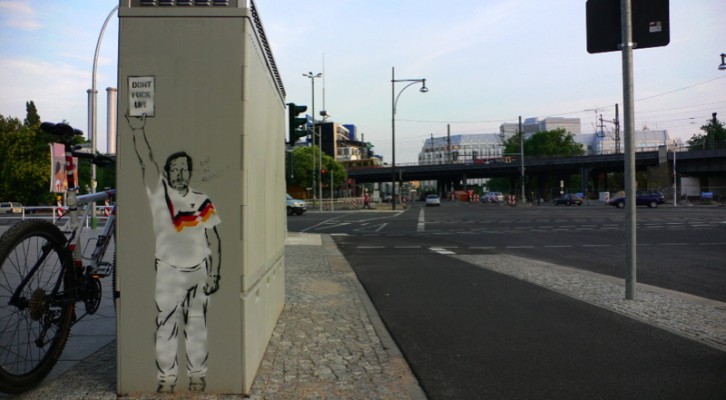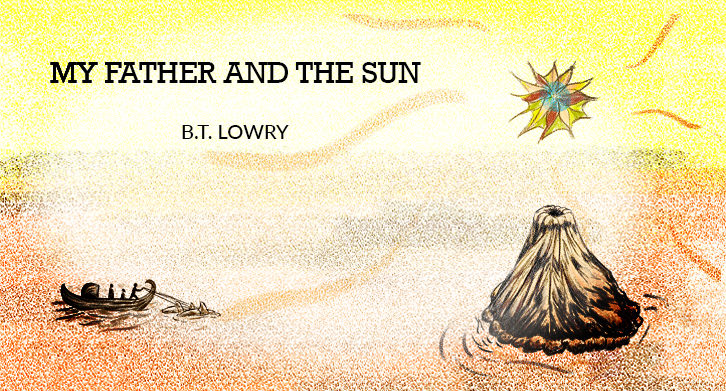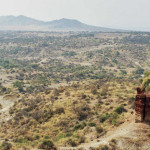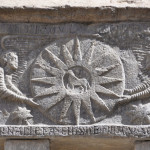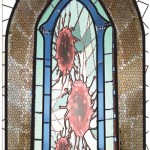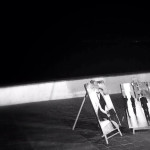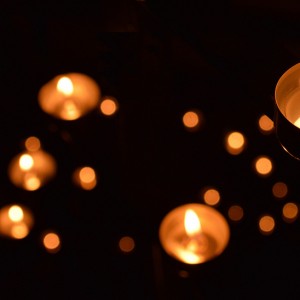“The Lord is my shepherd. I shall not want.”
The man had been reciting the psalm when they wheeled him into the curtained examination room and parked the gurney next to the wall. Doc Hampshire was hoping he would stop when he reached the end, but he just started over, his voice quiet and steady, his eyes seeming to stare at a point high beyond the fly-spotted, paint-peeling bamboo and plaster ceiling of the single story adobe building that they called the Clinic.
“I’m sorry, Mr. Mudongo,” Doc Hampshire said, “but I have no choice. I hope you understand.”
“He restoreth my soul.” The measured tones continued. Ofentse Mudongo gave no sign that he had heard.
It was almost midday and the temperature in the small building was above that of human blood, but Mudongo’s face was free of perspiration. Sunlight sneaked through the missing louvers of the wooden shutter behind the single window and cast striped shadows on the scrubbed wooden floor; the air was as still as death. Somewhere a fly was buzzing. Doc Hampshire could feel the sweat in his armpits and in the small of his back where the white medical smock was sticking to his skin. Get it done, he thought. He nodded to nurse Dineo Ndawana, who took a swab from the stainless steel tray on the bedside table and doused it in spirit. When the cold, damp wad touched the inside of his elbow Mudongo’s arm twitched once, rattling the links of the cuff that fastened his wrist to the rail of the gurney, then relaxed again.
“Surely goodness and mercy shall follow me all the days of my life.”
Nurse Ndawana had tied the rubber tube tourniquet around Mudongo’s upper arm and was picking up the syringe now, getting ready to draw the sample. As she turned back to him, Mudongo suddenly twisted his head to the side and looked at her directly.
“And I will dwell in the House of the Lord forever,” he said softly, holding her gaze with his own, as he emphasized the last words. Suddenly the nurse was flustered. She straightened up and turned to Doc Hampshire. He could see the tears forming in her eyes and when she blinked, one broke loose and rolled down her cheek. She reached up to brush it away.
“I’m sorry, Doctor,” she said. “I …”.
“That’s all right,” he said gruffly. “I’ll do it myself.” He took the syringe from her almost roughly, then waited until she pushed through the curtain, leaving him and Mudongo alone.
“It’s for the others,” Doc Hampshire felt the need to say, to explain once more, perhaps to convince himself rather than the man who lay helpless in front of him, and on whom he was about to commit an act that, for the first time in almost forty years practicing medicine, would violate the oath he had sworn to uphold.
But Mudongo was far away again, paying no attention to his surroundings.
“The Lord is my shepherd …”
The vein had swelled up nicely, dark purple against the coffee-colored skin. Doc Hampshire tapped it with the two middle fingers of his left hand to stabilize it then pressed down with the same two fingers either side of the vein while he slid the needle in with the other hand, smoothly but firmly, shouldn’t hurt a bit. Mudongo gave no indication that he was even aware of the procedure.
“… in green pastures. He leadeth me … “.
As blood started to ooze into the syringe, Doc Hampshire drew back gently on the plunger, not trying to suck the blood out, just keeping the pressure low enough not to hinder the flow. As it reached the 3cc mark he took the alcohol swab in his left hand and pressed it over the point of entry while he removed the needle as carefully as he had inserted it, then jabbed it into a chunk of sterile rubber on the equipment tray to seal it.
“Constable,” he called. Now it was done he felt a curious mixture of relief and guilt.
The young uniformed officer pulled back the curtain, looked at Mudongo’s still figure, then questioningly at the doctor. Doc Hampshire nodded. Constable Mokgacha also looked relieved, though apprehensive too. He could get into trouble for this, they both knew, but he had recently tested positive for the virus and his brother and his two sisters all had the full-blown disease.
“Take the cuff off,” Doc Hampshire said. “Just this one.” He was still pressing the swab against the puncture left by the syringe, but when Mudongo’s left wrist was freed he was able to flex the man’s arm at the elbow until the hand was almost touching the shoulder.
“Keep it like that for ten minutes,” he said from years of habit.
Mudongo had stopped his recital, but for a second there was no reaction. Then he looked at Doc Hampshire for the first time since he had been brought here.
“May God forgive you,” he said gently.
***
The first time Doc Hampshire met Ofentse Mudongo was on the tenth anniversary of his arrival in Mpechukudu. He had not intended to stay there anything like that long, but somehow it never seemed the right moment to leave. There had been a time in the distant past when he had been other people apart from just plain old Doc Hampshire. But here, in this backwater town in Botswana, Doc Hampshire was all he could find the energy to be. Some days he had trouble even doing that.
They just kept on dying; wasting away, one after the other, then dying, all with the same, pleading look in their eyes–or so it seemed to him after he had been there for a while. When Doc Hampshire arrived in Mpechukudu almost half the population was already infected and no matter what he did it kept on spreading, until now there was hardly a single person in this community of three thousand who was free of the disease.
Doc Hampshire had started out as an optimist. Even losing patient after patient, seeing the suffering in the eyes of so many people, so many children, he held onto the hope that one day, like the answer to a prayer, there would be a cure, a way of slowing, then stopping the relentless march of death. Until then he would do what he could.
He could never pinpoint the moment, if there was a moment, when that optimism disappeared. He just realized one afternoon, pulling the sheet over the face of yet another casualty, that it wasn’t there any more. The taste of it was still in his mind, but it was like the recollection of a good meal eaten a long time ago, in another place; it had lost its savor.
And then came Ofentse Mudongo, walking in through that door supporting his wife, Boikhutso, their five children following in single file and lining up against the wall in descending order of size, looking at the floor and trying not to fidget.
“My wife is sick, doctor,” Mudongo said. “Can you help her?” His voice was strong and confident but the pain was there underneath. Doc Hampshire knew that pain well, like a friend you saw every day. He had learned to recognize it without trying.
“We’ll see,” he said. There was something about Mudongo, something unusual about the man, but he couldn’t quite put his finger on it. Mudongo’s facial features identified him as a Kalanga, like most of the people in that region, but he was tall for a man of that tribe and his skin was paler than most, though still considerably darker than Doc Hampshire’s own sun-browned complexion.
They laid Boikhutso down on the examination bed and Mudongo straightened up and flexed his shoulders. He had been stooping while he assisted his wife and Doc Hampshire guessed they must have walked some distance to reach the Clinic.
He went through the motions of an examination–temperature, eyes, ears, heart, blood pressure–but it was depressingly clear what the problem was.
“She has the disease,” Mudongo said. It was not a question. “She took drugs before I met her. Before she found God.”
“Probably,” Doc Hampshire said. “I’ll need to do a blood test to be sure.” But Mudongo shook his head.
“No needles,” he said. “Please doctor. The medicine, yes, but our flesh and our blood belong to God. No needles, no knives. Our body is God’s temple. We must not defile it.”
This seemed outrageous to Doc Hampshire, but it was uttered with such simple conviction he could not summon up any response. A number of new churches had rooted themselves in this troubled land over the last decade and he knew that some of them taught interpretations of scripture that were at odds with his own rational scientific view of the world. However, his lack of success as a healer over the years had led him to accept that there was little point in questioning the beliefs of his patients, no matter how unreasonable they might seem.
“All right,” he said. “She must stay here for a few days, while I try the medicine and see how she reacts. You can visit her in the morning and afternoon, but you mustn’t stay too long.”
It wasn’t until Ofentse Mudongo and his children had left that it suddenly struck Doc Hampshire what was unusual about him, what the man’s condition was. It was so long since he had seen anyone like that, he had failed to recognize it: Ofentse Mudongo was healthy!
***
“Your wife may need a blood transfusion,” Doc Hampshire told Mudongo the next day. It wasn’t exactly true, but it wasn’t a lie, either. “Would you donate a sample for me to test? It’s a simple procedure.”
Mudongo shook his head and repeated his words from the day before.
“No needles, doctor,” he said. “It is God’s will. He will protect us.”
A number of people in the past had picked up the virus from improperly sterilized syringes, Doc Hampshire knew. And not just drug addicts, either. A fear of needles wasn’t so irrational. But now it had become a matter of religious principle. If Mudongo wouldn’t let his family doctor take blood to save his wife’s life, he certainly wouldn’t give a sample to be used in an experiment by people he’d never met.
Yet he had to know. Forty years of medicine and all his instincts were telling him that there was something here, something to be investigated. Ofentse Mudongo was a picture of health and yet his wife was wasting away from an assortment of minor infections that she couldn’t combat on her own. If there was something in Mudongo’s blood, in his DNA, something that protected him against the virus, then Doc Hampshire had a duty to find out. He owed it to the rest of the people of Mpechukudu, to the people of Botswana, to the world.
“And,” a tiny quiet voice kept reminding him, “if he, Doc Hampshire, were the one to identify the individual who carried the immunity, the protection, and if he could find a way to offer that gift to others, then maybe, just maybe, it would be enough to let him leave this town and resurrect his former career.”
But Ofentse Mudongo wouldn’t let him take a blood sample, so that was that, wasn’t it?
***
Doc Hampshire left Mudongo alone with his wife for the afternoon visit and went for a stroll around the town. As it happened, he found Constable Mokgacha sitting at a table outside a bar on the shady side of the central square. This was not surprising, for Mokgacha could almost always be found there at that time, sipping the one cold beer he allowed himself when he came off shift. They exchanged greetings, and then Doc Hampshire let himself be persuaded to sit down for a few minutes. He declined a beer, with the inner pang that always accompanied such a refusal, but accepted an iced lemonade.
“You know,” he said, after a few minutes of companionable silence, “I’ve been meaning to ask you. You remember that thief you brought to me a month or so ago?”
Crime of that kind was rare in Mpechukudu–the people all knew each other too well–but it did happen. Mokgacha had turned up one day pushing a sullen-faced young man with his hands cuffed behind his back and had asked Doc Hampshire to examine him. Now Mokgacha looked pleased at the recollection. It wasn’t often that he got the chance to arrest a real criminal. He nodded.
“Why did you ask for a blood test?” Doc Hampshire asked casually.
Mokgacha frowned, fanning himself with his peaked police cap.
“It’s the law, doctor,” he said. “Before I put him in a cell I have to find out whether he has the virus.” He looked suddenly glum. His own test had come back positive just a week before.
“And what if he had objected, say on religious grounds?”
Now Mokgacha cheered up abruptly. He laughed and slapped the cap against his knee. His wide brown eyes glinted with amusement and good spirit.
“He’s a thief, doctor. He doesn’t ‘object’ to anything.”
“And that’s the law?”
“That’s the law.”
It was the very next day, right after Ofentse Mudongo had paid his morning visit to his wife’s sick bed, that Doc Hampshire discovered his microscope was missing.
***
So now he had the blood sample. His stolen microscope, found by Constable Mokgacha in plain sight on a bench in Mudongo’s unlocked outhouse, had been returned.
Once Constable Mokgacha had taken Ofentse Mudongo back to the holding cell, Doc Hampshire separated the blood into three test tubes and carefully sealed all three. One would go to the main hospital in the capital, Gaborone. The other would start its journey in the same way, but would then continue on to a research center in Pretoria. The third would remain here. With the crude equipment at his disposal Doc Hampshire couldn’t hope to do any serious experiments, but he was unable to resist the idea of running some simple tests anyway, just so that if his hunch turned out to be correct he could feel he had been a real part of the discovery.
He had communicated with both Gaborone and Pretoria by e-mail and had received replies. There would be no delay in either place. Doc Hampshire was far from being the only one hoping for such a miracle. He should have an answer in at most a week. Once two of the samples had been packed in ice in a thermos and dispatched by train, and his own was safely stowed in the back of the Clinic’s refrigerator, he set off for the police station. He would drop all charges and Ofentse Mudongo could go home.
During the next few days he found it hard to concentrate on the mundane business of delaying death. He collected more blood from patients known to have the disease–though not, of course, from Boikhutso Mudongo–and at the end of each day he made up cultures in various proportions, smeared drops across slivers of glass and slid them under the microscope, peering through the eyepiece trying to see something, anything that would confirm his surging hope. He saw nothing, naturally. Much more sophisticated equipment than his would be necessary for that. But, he told himself, by doing this he was keeping in touch with the entire process–he was involved. He checked his e-mail four or five times a day, every time he had a spare moment.
When the reply came from Gabarone he couldn’t believe it.
“Idiots!” he muttered to himself. “They must have done the tests wrong.”
That evening he drank his first beer in over a decade. After all, it didn’t matter. When the results came back from Pretoria–the correct results–it wouldn’t be long before he was out of this place and back in private practice, his name a household word around the globe. Perhaps they would name the serum after him–if it was a serum. Maybe it would be a genetic procedure, based on Mudongo’s unique DNA: the Hampshire procedure. The words tasted even better than the beer, rolling across his tongue.
The next day he drank one beer at midday and two in the evening. The day after that he passed out on the way back from the bar and woke up in the morning fully clothed with no recollection of how he had got home. The hangover was like a long-forgotten ex-wife turning up on the doorstep and demanding alimony.
But the e-mail was waiting for him when he logged on. He was so clumsy with the mouse he almost deleted it by mistake, but he pulled himself together and tried to focus his eyes on the screen.
“… no special immunity … no unusual properties … repeated trials,” and at the bottom, on a line by itself, the laconic synopsis: “Sorry.”
Doc Hampshire experienced a swirl of nausea so intense he couldn’t hold his head up any more. His face was dripping with perspiration and he lowered it slowly, letting his arms slide away from him over the Formica-topped table that served as a desk until they skirted the computer monitor in a loose embrace.
“Beep!” the computer complained, as his damp forehead rolled back and forth over the keyboard. “Beep!”
Epilogue
Boikhutso Mudongo knelt before the altar and prayed, as she did early every morning before visiting the Clinic for her medicine. God had heard her request, she knew. She had the disease, but Ofentse and the children were safe, she was sure of that now. She had offered herself in their place. She would get sick and die, but it would stop with her, nobody would catch it from her.
If she had had Doc Hampshire’s medical training, she would have described herself as ‘a carrier, but not a vector’. Her body had altered the disease in a way that made it impossible for it to pass to the blood of another. That was the remarkable secret that Doc Hampshire hadn’t guessed, the secret that had never even occurred to him.
Boikhutso Mudongo clasped her hands to her breast and squeezed her eyes tight shut.
“Thank you, God,” she whispered, for the thousandth time.
author
Philip Lees is a British writer who lives on the Greek island of Crete, birthplace of Zeus and source of many myths and legends. His short fiction has appeared in a variety of print and electronic publications, while his story “Lucretia’s Nose” won him a trip to Hollywood and a place in the 2001 Writers of the Future awards. Philip has written two novels (so far unpublished) and is currently working on a third. His personal web pages may be found at http://www.philiplees.com.
photo credit: <a href=”http://www.flickr.com/photos/drmotte/202751192/”>dr. motte</a> via <a href=”http://photopin.com”>photopin</a> <a href=”http://creativecommons.org/licenses/by/2.0/”>cc</a>

